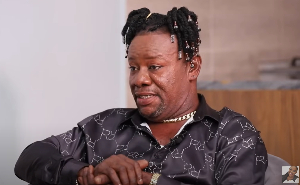Honest criticism is hard to take particularly from a relative, a friend, an acquaintance, or a stranger – Franklin Jones.
Criticism is a fact of life which no person is immune to. Criticism has variously been defined as the expression of disapproval of someone or something. It is a spoken or written opinion or judgment of what is bad or wrong about someone or something. Criticism may thus point out one or more faults of someone or something. Besides, it may be used to assess or consider the qualities of someone or something usually for the purpose of improvement.
There are two (2) main types of criticisms-constructive and destructive. Destructive criticism is devilish and primarily seeks to destroy. It comes from envious, jealous and mediocre minds as well as the hypocrites, the ignoramus, and inexperienced scoffers. Bishop Dag Heward-Mills says he “prefers to hear (his) dogs barking in the morning than to listen to critical and inexperienced scoffers”. Constructive criticism on the other hand is godly, sober, graceful, lovely and merciful. It calls for accountability, correction and improvement. Constructive criticism may for instance question the status quo or challenge conventional wisdom with the aim of initiating or causing positive life-transforming changes. It comes from experienced and learned minds. While constructive criticisms must be humbly received, destructively criticisms must always be ignored. “Listening to (destructive) critics is letting Muhammed Ali,” in the view of Robert Duvall, “decide which astronaut goes to the moon”. It must however be noted that destructive critics are not always wrong. Instead of fighting them you must use your time to develop and improve yourself.
There are limitations to criticisms, even the constructive ones. Firstly, never criticize what is blessing people. Secondly, never criticize God’s anointed vessels. God always has a peculiar way of dealing with His anointed vessels when they go wrong. Prophet Nathan was for instance sent by God to King David to rebuke him of his lustful adultery and gruesome murder. Besides, God judged him severely and openly. Absalom, his son, however criticized King David to his own peril. He simply had no license to criticize or judge his father despite the latter’s sins. Thirdly, never criticize or judge people who have judged themselves. Thus people who have honestly accepted their faults and truly repented need not be criticized by others. God even never judge people who judge themselves and truly repent. You choose to do so at your own peril!
Criticism operates under the law of reaping and sowing. For Bishop Dag Heward-Mills, anytime you criticize or judge another person you set yourself up for judgment. Jesus Christ spoke about this truth in Matthew 7:1-5. Jesus in effect taught us these lessons about judging others: 1. Judgment gives birth to future judgment, as rightly stated by Bishop Dag; 2. A person is judged in future in the same manner, degree or quality he used to judge others; 3. It is better to always judge oneself than to judge others; 4. Hypocrites are prohibited from judging others; and 5. Only persons with integrity or who have rightly examined themselves can judge others.
It must be noted that Jesus is not necessarily forbidding us from criticizing or judging others. His primary concern is that it must be done rightly and well. The Word of God is the standard for criticizing or judging someone or something. Jesus once said, “I can of mine own self do nothing: as I hear, I judge: and my judgment is just; because I seek not mine own will, but the will of the Father which hath sent me. If I bear witness of myself, my witness is not true” – John 5:30-31. God’s will is His Word. God’s Word is His power and wisdom. It goes without saying that we need divine wisdom to criticize constructively. Bimbo Odukoya has this advice for marriage couples, “In times when couples have to correct one another they should desist from criticizing each other. Criticism only results in resentment and ultimately malice. I always recommend that any such correction should be preceded with compliments”.
Criticism is a test of your humility. How you respond to any form of criticisms demonstrate your level of humility. It also determines whether or not you grow in wisdom. That is why you need wisdom to respond to your critics. Wisely ignore destructive criticisms but humbly accept constructive ones. They will not only help you examine your ways, motives and attitudes but will also add value to your life and work. Proverbs 25:12 says that it is a badge of honour to accept constructive criticisms. Always develop an attitude of listening to your critics and learning from all that is said, if possible. However, do not be distracted by what others do or say. You have your life to live; rightly live it in the highest and best way. Fulfill your destiny by right focused endeavour, having in mind that you shall one day stand before God for the judgment of your deeds. Therefore, pleasing God in everything you do and say should always be your guide. In this light, I agree with Archbishop Nicholas Duncan Williams in saying that, “People who make history do not depend upon public opinion. And public opinion is not always right”.
Richard Obeng Mensah, author of right your writing. borncapy@yahoo.com/www.richard-obeng-mensah.blogspot.com
Religion of Monday, 2 July 2012
Source: Mensah, Richard Obeng
















